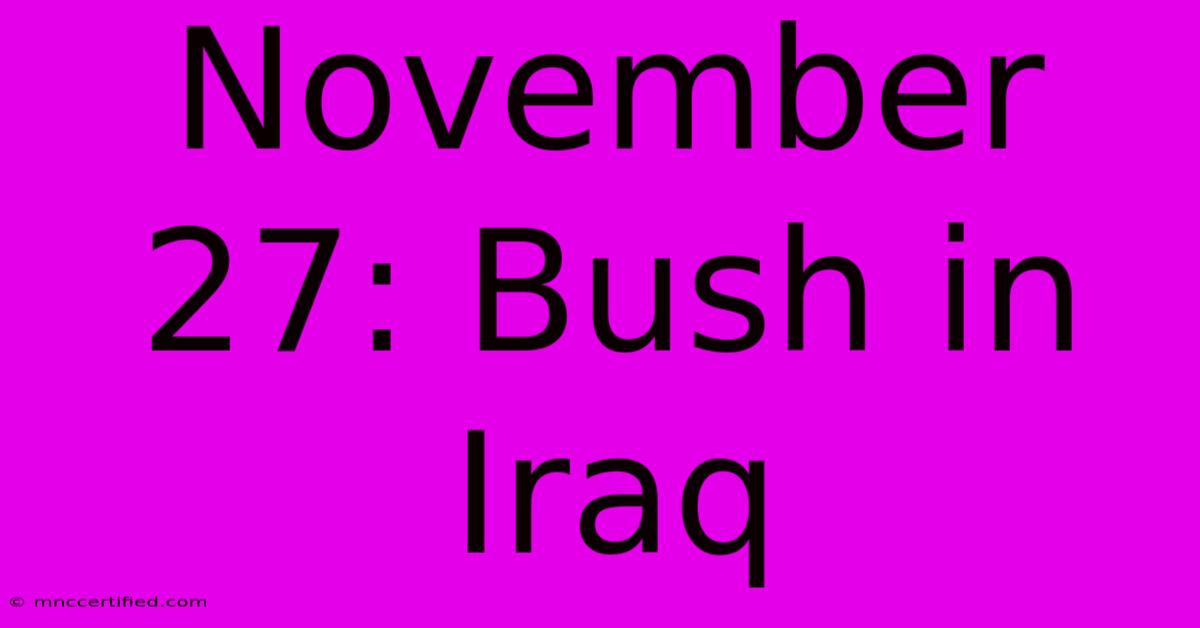November 27: Bush In Iraq

Table of Contents
November 27, 2003: A Pivotal Day in the Iraq War Under President Bush
November 27th, 2003, marked a significant point in the Iraq War, a conflict deeply intertwined with the presidency of George W. Bush. While not a single, defining event, this date encapsulates the complexities and challenges faced by the Bush administration in the aftermath of the invasion. This article will explore the key events and their lasting impact.
The Shifting Sands of the Post-Invasion Landscape
The initial invasion of Iraq in March 2003 had been swift, toppling Saddam Hussein's regime. However, the post-invasion phase proved far more tumultuous. November 27th found the coalition forces grappling with several critical issues:
-
The insurgency: By this point, the insurgency had gained significant momentum. Attacks against coalition troops and Iraqi civilians were increasing in frequency and intensity. This represented a major failure of the initial post-invasion planning, which had underestimated the strength and resilience of the resistance. Key figures: The activities of various insurgent groups, including foreign fighters, were escalating, posing a significant threat to the stability of the country.
-
The Coalition Provisional Authority (CPA): The CPA, led by Paul Bremer, was struggling to establish a functioning Iraqi government and provide essential services. The CPA's decisions, including the disbanding of the Iraqi army, are often cited as contributing factors to the escalating violence. Key Challenges: The lack of a clear plan for transitioning power to a legitimate Iraqi government created a power vacuum that the insurgents readily exploited.
-
The search for WMDs: The Bush administration's justification for the invasion, largely based on the alleged possession of weapons of mass destruction (WMDs) by Saddam Hussein, had not yielded any credible evidence. The lack of WMD discovery further fueled criticism of the war and eroded public support, both domestically and internationally. Consequences: The failure to find WMDs significantly damaged the credibility of the Bush administration and raised questions about the intelligence used to justify the invasion.
Key Events Surrounding November 27th, 2003 (and the broader context)
While pinpointing specific, widely-reported events on this single date is challenging, the period surrounding it reflects the overall situation:
- Ongoing combat operations: Daily reports highlighted continued clashes between coalition forces and insurgents across Iraq. These ranged from small-scale ambushes to larger-scale engagements.
- Political instability: The nascent Iraqi Governing Council, intended to be a stepping stone towards a fully sovereign government, faced internal divisions and struggled to assert its authority.
- Humanitarian crisis: The ongoing violence and instability caused a growing humanitarian crisis, with many Iraqis displaced from their homes and in need of assistance.
The Long-Term Impact of the Iraq War and the Bush Administration's Legacy
The Iraq War, and the events surrounding November 27th, 2003, profoundly impacted the Bush presidency and American foreign policy. The war's cost, both in terms of human lives and financial resources, was immense. The prolonged conflict also significantly damaged America's international standing and contributed to a rise in anti-American sentiment globally.
Analyzing the Information and Context
Understanding the events surrounding November 27th, 2003, requires considering the broader context of the Iraq War and the Bush administration's policies. It's essential to consult diverse sources, including official reports, news archives, and academic analyses, to gain a comprehensive understanding of this complex period.
SEO Keywords:
- Iraq War
- George W. Bush
- November 27, 2003
- Coalition Provisional Authority (CPA)
- Paul Bremer
- Insurgency
- Weapons of Mass Destruction (WMDs)
- Iraq invasion
- Post-invasion Iraq
This article provides a foundation for further research. By exploring various primary and secondary sources, a more complete picture of this pivotal moment in history can be constructed. Remember to always cite your sources properly.

Thank you for visiting our website wich cover about November 27: Bush In Iraq. We hope the information provided has been useful to you. Feel free to contact us if you have any questions or need further assistance. See you next time and dont miss to bookmark.
Featured Posts
-
Redshaw Insurance Rushville Il
Nov 27, 2024
-
35 000 Year Old Saber Toothed Kitten Mummy
Nov 27, 2024
-
Auto Insurance Chatham Ontario
Nov 27, 2024
-
Ranchers And Farmers Insurance
Nov 27, 2024
-
Value Guard Property Insurance
Nov 27, 2024